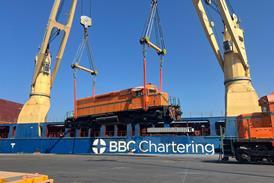December 6 - The World Shipping Council (WSC) and the International Chamber of Shipping (ICS) has asked the International Maritime Organisation (IMO) to establish an international legal requirement that all loaded containers be weighed at the marine port
In a joint statement, the WSC and the International Chamber of Shipping (ICS) said: "The issue of overweight containers has been a subject of industry, insurance, and at times government, concern over the years, and has from time-to-time become an issue of concern to the general public after incidents involving overweight boxes.
"Most recently, the Maritime Research Institute of the Netherlands has concluded a joint industry-government research project about cargo securing, including collapsing container stacks, and included in its recommendations a call for compulsory weighing of containers prior to vessel loading.
"The conclusions and recommendations from the research project ('Lashing@Sea') were recently reviewed at the 15th meeting of the International Maritime Organization (IMO) Dangerous Goods, Solid Cargoes and Containers Subcommittee. The Subcommittee agreed that, in the interest of safety, there is a need to consider ways and means to ensure that the correct weight of the containers is declared to the carrier and communicated to the ship's master in order to allow for correct and well-informed handling and stowage. The Subcommittee then invited Member Governments and international organizations to submit further information to the Committee for appropriate action."
The report suggests that currently there is no reliable data available regarding the number of overweight containers, but the two organisations state they believe the problem to be significant and widespread, even rampant in places, suggesting that shipping lines have reported that in severe cases, the overweight or incorrectly declared weights reach 10 percent of the total cargo on board a vessel. Some carriers report that it is common for actual total cargo weight aboard ship to be 3 to 7 percent greater than the declared weight.
Among the problems arising from this abuse of the system are damage to ships, cargo liability claims, collapsed container stacks, boxes lost overboard, stability and stress risks for ships, risk of personal injury or death to seafarers and workers ashore, supply chain delays and impairment of service schedule integrity. Overweight containers also result in lost revenue and earnings, liability for accidents and fines on roads, leading to time and administrative efforts and costs to seek reimbursement, and impairment of vessels' optimal trim and draft, thus causing impaired vessel efficiency, suboptimal fuel usage, and greater air emissions.
According to the WSC and ICS, they are ready to work with other parties towards reaching agreement at the IMO's Maritime Safety Committee in May 2011 that will include the issue of overweight containers in the IMO's work programme, so that a specific proposal is introduced to amend the Safety of Life at Sea (SOLAS) convention.
















